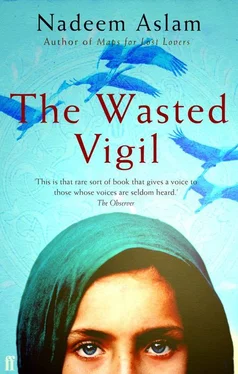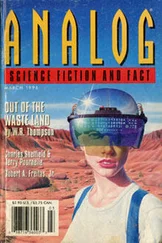Nadeem Aslam - The Wasted Vigil
Здесь есть возможность читать онлайн «Nadeem Aslam - The Wasted Vigil» весь текст электронной книги совершенно бесплатно (целиком полную версию без сокращений). В некоторых случаях можно слушать аудио, скачать через торрент в формате fb2 и присутствует краткое содержание. Год выпуска: 2009, Издательство: Faber and Faber, Жанр: Современная проза, на английском языке. Описание произведения, (предисловие) а так же отзывы посетителей доступны на портале библиотеки ЛибКат.
- Название:The Wasted Vigil
- Автор:
- Издательство:Faber and Faber
- Жанр:
- Год:2009
- ISBN:нет данных
- Рейтинг книги:4 / 5. Голосов: 1
-
Избранное:Добавить в избранное
- Отзывы:
-
Ваша оценка:
- 80
- 1
- 2
- 3
- 4
- 5
The Wasted Vigil: краткое содержание, описание и аннотация
Предлагаем к чтению аннотацию, описание, краткое содержание или предисловие (зависит от того, что написал сам автор книги «The Wasted Vigil»). Если вы не нашли необходимую информацию о книге — напишите в комментариях, мы постараемся отыскать её.
The Wasted Vigil — читать онлайн бесплатно полную книгу (весь текст) целиком
Ниже представлен текст книги, разбитый по страницам. Система сохранения места последней прочитанной страницы, позволяет с удобством читать онлайн бесплатно книгу «The Wasted Vigil», без необходимости каждый раз заново искать на чём Вы остановились. Поставьте закладку, и сможете в любой момент перейти на страницу, на которой закончили чтение.
Интервал:
Закладка:
Casa had demonstrated and explained everything on the previous visit, sitting on the floor in a back room. Bihzad and Casa — in that interior filled with crates of rocket-propelled grenades, packets of explosives that smelled like almonds, and boxes full of DVDs and CDs depicting jihad as Allah the Almighty saw it and not as the world’s media distorted it — had then talked about their childhoods: the hunger, the refugee camps, the deaths one by one of the adults around them due to various causes, the orphanages, the beatings and worse, the earning of daily bread as beggars or labourers in the bazaars. Neither remembered the date or place of his birth, nor had any firm memory of his mother and father. Pointing to the lengths of blue, green, red and yellow wires that lay around them, Casa said:
‘When I was a child I had knocked over a basket of silk embroidery threads, probably belonging to my mother. That’s the only thing I remember of her. The threads suddenly unspooled along the floor in many brilliant lines and then went out of the open door and down a staircase.’ He fell silent and then said through a sigh, ‘Yes, that’s the only thing I remember.’
Now Casa comes forward and shuts the truck door, sealing Bihzad in.
With the vehicle just beyond biting point, he rolls out of the gate set in the boundary wall of the farmhouse, the wrinkled colour of the thousand poppies now behind him.
The road is lit by the late-morning sun. One of the riders is in front of him and the other he can see in the rear-view mirror. It seems it is of no concern to these people that Bihzad now knows where the farmhouse is situated. On the previous occasion he was picked up at the outskirts of Jalalabad and blindfolded before being brought to the farmhouse, and the procedure was the same again when he was taken back to the edge of the city. But this time they have let him drive out of there with full knowledge of how to find the place again. An additional few moments and everything is perfectly clear to him: the instant he throws the switch the bomb will be armed — and the instant he presses the button the truck will explode. It’s not a timer, but a detonator.
He feels as though his heart is clamped in someone’s fist. And when, at a gentle curve in the road, his shadow begins to inch towards the passenger seat, the feeling intensifies. He experiences this dread whenever he is in an area not yet swept for landmines — wanting always to pull his shadow closer to him, thinking the weight of it is enough to set off whatever death-dealing device is hidden there.
He has no choice, and nothing but Allah’s compassion to see him through this. Perhaps he should swerve and try to disappear down a side street, try to dismantle the bomb.
He wishes the road and landscape would stop unwinding before him, wishes it were only a painted screen to arrive at and burst through to the other side, emerging into another kinder realm. Just some place that is not this Hell. To ask for Paradise would require someone less humble. But the truck continues its journey, bearing down on the city in the distance.
DAVID WALKS OUT of the minaret of the good djinn. Marcus is asleep up there surrounded by the millennia-old mountain vista.
He must go back to the school, to take care of some paperwork. His car is parked under a chinar plane tree within the school’s enclosure wall. He’ll bring it here and then, having met Bihzad, drive with Marcus to Usha. From the foliage of the chinar trees in a miniature painting, said Zameen, it is possible to tell if it was painted in the Herat of the late fifteenth century. Distinctive serrations and ways of colouring.
David will have to carefully question the young man to see if he is who he claims to be.
Bihzad Benediktovich Veslovsky.
There is a faint continuous rumble from the sky above the street. An unmanned Predator drone collecting intelligence on behalf of the CIA, he thinks, or a fighter jet the Special Forces have summoned, calling down a missile strike on a hiding place of insurgents. The information that selects the target isn’t always without its faults, he knows. In Usha at the end of 2001, the house of the warlord Nabi Khan was reduced to rubble from the air, everything and everyone inside a hundred-yard radius was charred, but later it turned out that he had not been in the vicinity. His rival, Gul Rasool, had lied to the Americans just to see the building decimated, to have as many of Nabi Khan’s relatives and associates killed as possible. Gul Rasool now has a position in the ministry of reconstruction and development, installed as the chief power in Usha. Nabi Khan is at large, though there have been rumours of his death, rumours of him having moved to Iraq to fight the Americans there. Both men are little short of bandits and the cruellest of barbarians, seeing all of life’s problems in terms of injured self-esteem, their places in infamy well earned.
He makes his way through the press of bodies in the bazaar, the bustle of any of these Asian cities. The orange-blossom air. A little girl goes by, walking possibly towards the day when she will disappear behind the burka, her face never to be seen again. Perhaps nowhere is the Mona Lisa loved more than here in Asia, and he remembers Zameen telling him that on seeing it for the first time as a child she had wondered what that black line was, high on Mona Lisa’s forehead. It was, of course, the edge of her veil. Zameen was seeing the picture in a poor reproduction that missed the thin gossamer fabric covering the head. At that age, she said, it didn’t occur to her that women in the West could wear veils.
Instead of going towards the school he has taken a short detour and entered this bazaar, looking for a place that sells satellite phones. With the landline to Marcus’s house rotted away, David has decided he’ll buy a phone for Larissa Petrovna which she must keep with her while she is here.
He stands at a crossroads and looks around, suddenly finding himself lost, surrounded by noise and talk. The men and women of Afghanistan share between them a store of tales so extensive, so rich and ancient, that it has been said it is unrivalled by any other land. Alexander passed through here in 329 BC with thirty thousand troops, and so now a man selling what look like centuries-old Greek coins approaches David. The years of war and civil war have emptied this country’s museums. One 190-carat diamond in the sceptre of Russia’s Catherine, bought by her from an Armenian gem merchant, was first the eye of a god in a temple in India, and so it is that no one can be certain where most of Afghanistan’s looted treasures have ended up.
He turns and goes back along the street, thinking of how a long time ago, when they were both schoolchildren, his brother Jonathan had asked him to make his way out of a maze in a puzzle book. Only when he failed was it revealed that by drawing a small line in black ink across the correct path, Jonathan had mischievously blocked the only way out. Bringing him nothing but dead ends.
*
With a smile Marcus raises a hand when he realises that Bihzad is — that Bihzad was — the driver of the vehicle that has just gone past him. He hopes he has been quick enough, that the greeting can be seen in the rear-view mirror. The boy’s apparel is patched and dirty, his mouth full of crooked teeth, but he is young and, as Qatrina once said, two things make everyone appear beautiful: youth and the light of the moon.
Marcus is walking towards the school. He woke up in the minaret and found David gone, but he knows where he must be.
Bihzad’s truck is going in the same direction as him. The hand of a traffic controller, at some intersection located further up, has released a flood of vehicles just ahead, and now Marcus’s view of the truck has become obstructed, though he can see the school building.
Читать дальшеИнтервал:
Закладка:
Похожие книги на «The Wasted Vigil»
Представляем Вашему вниманию похожие книги на «The Wasted Vigil» списком для выбора. Мы отобрали схожую по названию и смыслу литературу в надежде предоставить читателям больше вариантов отыскать новые, интересные, ещё непрочитанные произведения.
Обсуждение, отзывы о книге «The Wasted Vigil» и просто собственные мнения читателей. Оставьте ваши комментарии, напишите, что Вы думаете о произведении, его смысле или главных героях. Укажите что конкретно понравилось, а что нет, и почему Вы так считаете.












